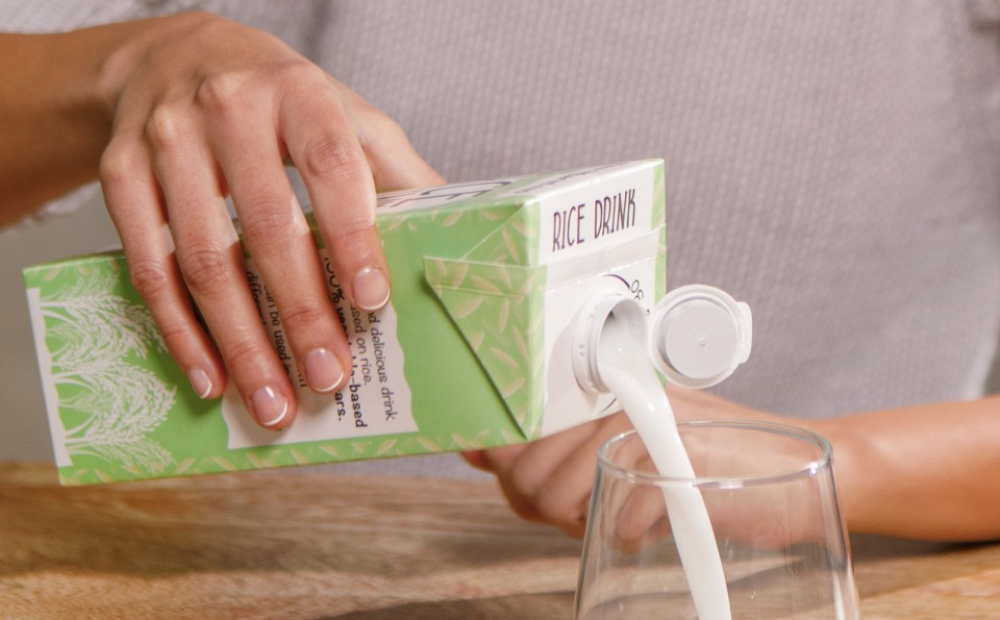Tetra Pak strives to produce the most sustainable packaging in the world

Anna Ilomäki is Tetra Pak’s Key Account Director in Finland and Project Manager in Northern Europe in the cap reform process related to the SUP Directive. She is here to talk about Tetra Pak’s carton packages for beverages. They contain plant-based plastic and are distinguished from packaging made of fossil-based plastic by a subtle leaf etched on the cap. Another thing about the cap is that it no longer detaches from the packaging.
The SUP Directive aims to reduce the amount of plastic litter, so caps will remain attached to packages and no longer detach completely.
The SUP Directive keeps facilities busy
The SUP Directive was initially a reaction to the global problem of marine plastic litter, though it has since expanded to cover more single-use products that contain plastic. The directive also governs Tetra Pak’s operations with regard to straws and especially caps on beverage packages.
“Tetra Pak supports legislation that promotes recycling and prevents littering,” Ilomäki describes the company’s view of the directive.
Tetra Pak’s factories are mainly located in Europe, including in France and Spain. There are more than a thousand Tetra Pak packaging lines at customers’ premises in Europe, so the scale of the change is huge.
The directive, which entered into force quickly, has, of course, meant additional work. Ilomäki says that the project is somewhat challenging due to the tight schedule, but the required changes can still be achieved by prioritising activities. Caps must be tethered to most plastic beverage containers by July 2024.
“In Finland, we’re progressing at the same pace as other countries, or we may even be slightly ahead,” says Ilomäki about the progress of the cap project.
“We’ve received both criticism and praise”
Ilomäki says that new features in packaging often attract criticism from consumers, but the cap reform has also prompted a lot of praise. She understands both views.
“Criticism was expected. Consumers are used to opening their breakfast juice carton in a certain way,” says Ilomäki.
Tetra Pak has made the change smoother by, for example, having consumers test new types of caps. Some packages also come with opening instructions. When packages with the new caps have been launched on the market, consumers have been provided with information and their feedback actively responded to.
The SUP Directive as such means nothing to those who don’t know its contents, but people do understand what preventing litter and protecting the oceans and the environment entail.
Ideally, packages should be both user-friendly and recyclable. Tetra Pak’s packages with the new type of cap make recycling easier as there are no parts, such as tamper bands, that need to be removed and recycled separately. The snap that the cap makes when it is closed is part of the product development: it clearly indicates that the cap is tightly closed.
Ilomäki says that consumers need to be encouraged to use the new caps by explaining the reasoning behind them in a clear manner. The SUP Directive as such means nothing to those who don’t know its contents, but people do understand what preventing litter and protecting the oceans and the environment entail.
“We’re in a transition phase. We believe that consumers will get used to tethered caps as so many packages will have them,” Ilomäki concludes.
The Packaging Waste Regulation encourages people to be responsible
In addition to the SUP Directive, Tetra Pak’s operations are guided by the EU’s Packaging and Packaging Waste Regulation (PPWR), which is currently under revision. The Regulation aims to reduce packaging waste by ensuring that all packaging is either fully recyclable or reusable by 2030.
Tetra Pak fully supports these goals. “Our aim is to produce the most sustainable packaging in the world,” says Ilomäki. She explains that this means packaging that is made entirely of renewable or recycled raw materials and is fully recyclable and carbon neutral.
Achieving the targets also depends on consumers’ recycling habits, and for this reason Tetra Pak provides consumers and its customers with information about recycling. The annual competition for school children, Kartonkikilpailu, encourages and teaches children to sort and recycle their waste.